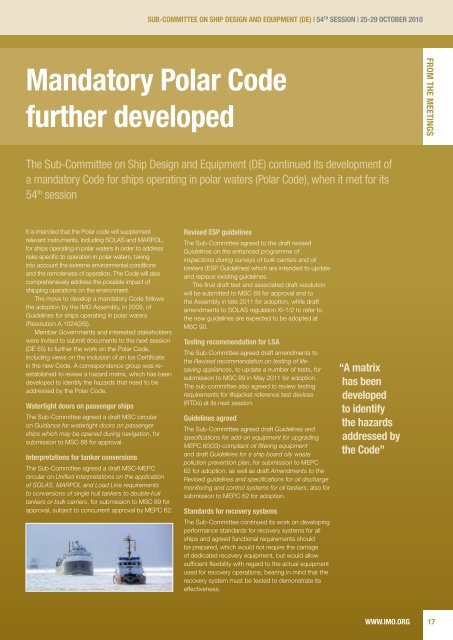Piracy: orchestrating the response - IMO - International Maritime ...
Piracy: orchestrating the response - IMO - International Maritime ...
Piracy: orchestrating the response - IMO - International Maritime ...
Create successful ePaper yourself
Turn your PDF publications into a flip-book with our unique Google optimized e-Paper software.
SUB-COMMITTEE ON SHIP DESIGN AND EqUIPMENT (DE) | 54 TH SESSION | 25-29 OCTOBER 2010<br />
Mandatory Polar Code<br />
fur<strong>the</strong>r developed<br />
The Sub-Committee on Ship Design and Equipment (DE) continued its development of<br />
a mandatory Code for ships operating in polar waters (Polar Code), when it met for its<br />
54 th session<br />
It is intended that <strong>the</strong> Polar code will supplement<br />
relevant instruments, including SOLAS and MARPOL,<br />
for ships operating in polar waters in order to address<br />
risks specific to operation in polar waters, taking<br />
into account <strong>the</strong> extreme environmental conditions<br />
and <strong>the</strong> remoteness of operation. The Code will also<br />
comprehensively address <strong>the</strong> possible impact of<br />
shipping operations on <strong>the</strong> environment.<br />
The move to develop a mandatory Code follows<br />
<strong>the</strong> adoption by <strong>the</strong> <strong>IMO</strong> Assembly, in 2009, of<br />
Guidelines for ships operating in polar waters<br />
(Resolution A.1024(26)).<br />
Member Governments and interested stakeholders<br />
were invited to submit documents to <strong>the</strong> next session<br />
(DE 55) to fur<strong>the</strong>r <strong>the</strong> work on <strong>the</strong> Polar Code,<br />
including views on <strong>the</strong> inclusion of an Ice Certificate<br />
in <strong>the</strong> new Code. A correspondence group was reestablished<br />
to review a hazard matrix, which has been<br />
developed to identify <strong>the</strong> hazards that need to be<br />
addressed by <strong>the</strong> Polar Code.<br />
Watertight doors on passenger ships<br />
The Sub-Committee agreed a draft MSC circular<br />
on Guidance for watertight doors on passenger<br />
ships which may be opened during navigation, for<br />
submission to MSC 88 for approval.<br />
Interpretations for tanker conversions<br />
The Sub-Committee agreed a draft MSC-MEPC<br />
circular on Unified interpretations on <strong>the</strong> application<br />
of SOLAS, MARPOL and Load Line requirements<br />
to conversions of single hull tankers to double-hull<br />
tankers or bulk carriers, for submission to MSC 89 for<br />
approval, subject to concurrent approval by MEPC 62.<br />
Revised ESP guidelines<br />
The Sub-Committee agreed to <strong>the</strong> draft revised<br />
Guidelines on <strong>the</strong> enhanced programme of<br />
inspections during surveys of bulk carriers and oil<br />
tankers (ESP Guidelines) which are intended to update<br />
and replace existing guidelines.<br />
The final draft text and associated draft resolution<br />
will be submitted to MSC 89 for approval and to<br />
<strong>the</strong> Assembly in late 2011 for adoption, while draft<br />
amendments to SOLAS regulation XI-1/2 to refer to<br />
<strong>the</strong> new guidelines are expected to be adopted at<br />
MSC 90.<br />
Testing recommendation for LSA<br />
The Sub-Committee agreed draft amendments to<br />
<strong>the</strong> Revised recommendation on testing of lifesaving<br />
appliances, to update a number of tests, for<br />
submission to MSC 89 in May 2011 for adoption.<br />
The sub-committee also agreed to review testing<br />
requirements for lifejacket reference test devices<br />
(RTDs) at its next session.<br />
Guidelines agreed<br />
The Sub-Committee agreed draft Guidelines and<br />
specifications for add-on equipment for upgrading<br />
MEPC.60(33)-compliant oil filtering equipment<br />
and draft Guidelines for a ship board oily waste<br />
pollution prevention plan, for submission to MEPC<br />
62 for adoption, as well as draft Amendments to <strong>the</strong><br />
Revised guidelines and specifications for oil discharge<br />
monitoring and control systems for oil tankers, also for<br />
submission to MEPC 62 for adoption.<br />
Standards for recovery systems<br />
The Sub-Committee continued its work on developing<br />
performance standards for recovery systems for all<br />
ships and agreed functional requirements should<br />
be prepared, which would not require <strong>the</strong> carriage<br />
of dedicated recovery equipment, but would allow<br />
sufficient flexibility with regard to <strong>the</strong> actual equipment<br />
used for recovery operations, bearing in mind that <strong>the</strong><br />
recovery system must be tested to demonstrate its<br />
effectiveness.<br />
“A matrix<br />
has been<br />
developed<br />
to identify<br />
<strong>the</strong> hazards<br />
addressed by<br />
<strong>the</strong> Code”<br />
WWW.<strong>IMO</strong>.ORG<br />
FROM THE MEETINGS 17

















